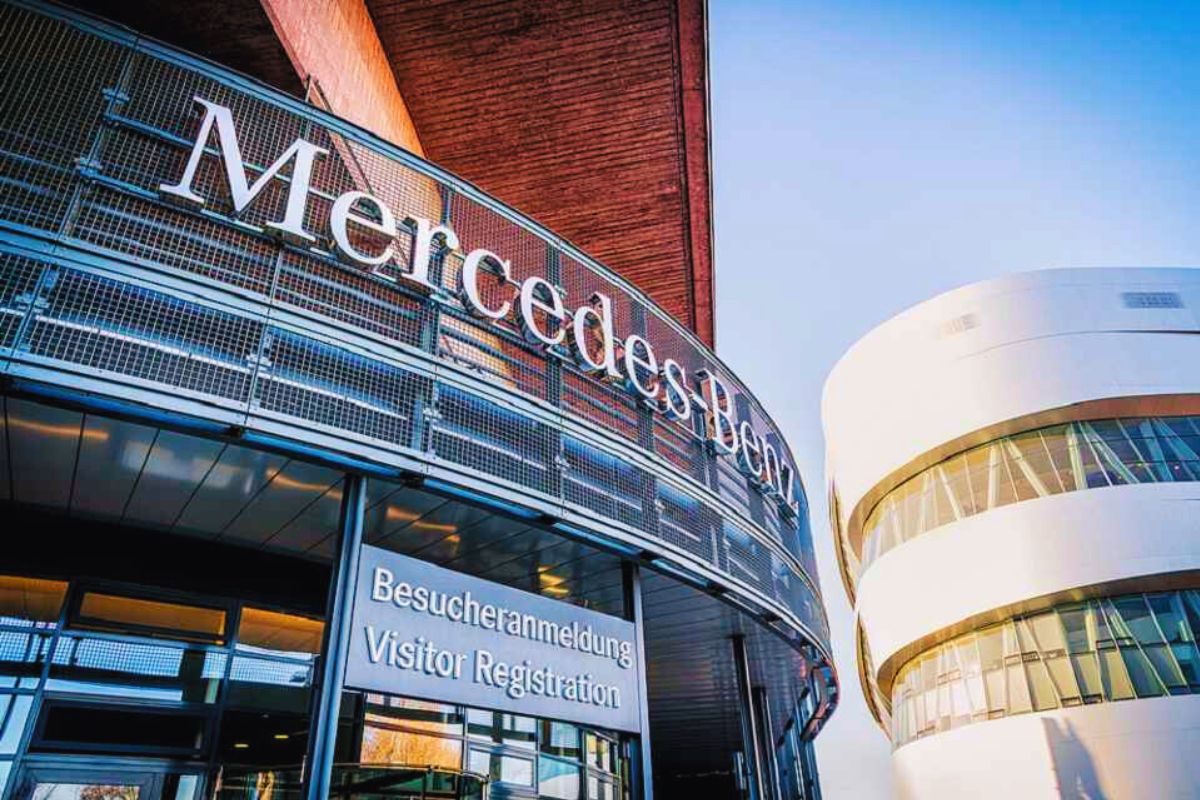Closure of Mercedes-Benz Retail Group’s UK Operations

In April 2025 Mercedes-Benz announced that its wholly owned dealer network in the UK, Mercedes-Benz Retail Group (MBRG), would cease trading. The decision follows years of unprofitable operation in Britain. MBRG has sold off or closed its final dealerships and—as revealed in its latest accounts—will be wound down into dormancy. This marks the end of manufacturer-owned retailing for Mercedes in the UK and completes the brand’s shift to an agency (direct-to-consumer) sales model that began in 2023.
Financial and Operational Background
By 2023, MBRG’s financial losses had mounted to unsustainable levels. The group recorded a £35.0 million operating loss in 2019 and a further £20.9 million loss in 2020. In response, Mercedes-Benz UK gradually dismantled the dealer arm through strategic divestments. Over recent years, MBRG sold most of its franchises and market territories to larger dealer groups. For example, its dealerships and regions were sold to the likes of LSH Auto UK, Sytner Group, L&L Automotive, Sandown Motors and Hedin Automotive. It also closed unprofitable outlets (notably in London and elsewhere) as part of a network “realignment”. According to the company’s finance chief, once the remaining dealerships were sold off, MBRG ceased trading. The proceeds were used to repay Mercedes-Benz UK (£21.5 m) and a final dividend (£17 m) to the parent. The official accounts note that MBRG then disposed of its remaining leasehold properties and receivables, settled debts and planned to transition into a dormant status.
-
Chronology of key events: Loss-making years (2019–20), divestment and closures from 2021 onward, leading to final dealerships being sold in late 2024 and formal cessation of trade in early 2025.
-
Major divestments: In the final phase, MBRG offloaded dealerships to established retailer groups: LSH (Stratstone), Penske-owned Sytner, L&L Automotive (Vertu Motors), Sandown, and Sweden’s Hedin group.
-
Financial recap: After disposing of assets, MBRG repaid all capital allocations and cleared debts. CFO Wolfgang Pipperger confirmed that, following asset sales, the company “ceased to trade” and was being moved into a dormant state.
Symbolic Closures – The End of Bradford

One closure in particular stood out as an industry milestone. Mercedes-Benz of Bradford, originally opened in 1953, finally shut its doors on 31 October 2024 after more than 70 years of operation. This long-standing dealership in West Yorkshire had become emblematic of Mercedes’ retail heritage. Its closure—now listed as “permanently ”closed”—underscores the sweeping change: even venerable franchises are being cut loose in the industry shake-up. (Notably, this Bradford outlet had already changed hands in 2008 when dealer group Stratstone—since acquired by US conglomerate Lithia—took it over.) The end of Mercedes in Bradford marked a highly symbolic “end of an era” for the brand’s traditional UK retail presence.
Industry Consolidation and Lithia Motors
Mercedes’ exit comes amid a broader wave of consolidation in UK motor retail. Most prominently, US group Lithia & Driveway acquired Pendragon plc (parent of the Stratstone and Evans Halshaw dealership chains) in a £397 million deal completed in early 2024. This takeover brought hundreds of Mercedes franchises (alongside other brands) under the Lithia umbrella. For example, Stratstone—which had sold Mercedes of Bradford—was itself acquired by Lithia as part of the Pendragon deal. Industry analysts note that many recent dealer closures are tied to such takeover activity. Zeus Capital’s Carl Smith observes that a “high number of takeovers—largely by North American firms—is… driving” network cuts, as buyers trim underperforming or duplicate sites. Large UK groups (Vertu, Marshall, etc.) have similarly been pruning their portfolios after acquisitions. In short, consolidation is gathering pace: overseas (especially US) investors are buying UK dealer networks, then rationalizing them by closing marginal outlets. (Pendragon’s sale saw rival bids from Hedin/Penske and AutoNation, highlighting foreign interest in UK assets.)
Structural Challenges for Traditional Dealerships
The MBRG collapse reflects multiple structural headwinds facing franchised dealers. Key challenges include:
-
Online sales and new models: Car buyers are increasingly digital. Industry surveys report that roughly 30% of consumers now intend to purchase their next vehicle entirely online. Brands like Tesla sell directly to consumers, and traditional agencies must compete with online portals and subscription services. The shift toward “omni-channel” buying and agency sales reduces footfall at physical showrooms and pressures traditional sales operations.
-
Cost pressures: Rising costs have squeezed dealer profitability. Higher national living wages, increased employer National Insurance, and energy/inflation costs are cited as “material headwinds”. The Grant Thornton dealer report warns that weaker margins are expected into 2024 as interest rates, wage inflation and other overheads climb. In a softer market, dealers must focus on volume while protecting margins amid these cost challenges.
-
Supply chain and market cycles: Disruptions from chip shortages and logistics snarls have eased, but new issues have emerged. Inventories of new cars have risen (due partly to financial incentives and pre-registrations as demand softened with higher finance costs), leading to oversupply pressure on prices. Dealers face the dual problem of easier vehicle availability (which can boost sales) and thinner margins on each sale.
-
EV transition: The pivot to electric vehicles also reshapes dealer economics. EVs generally need less routine servicing (they have fewer moving parts), meaning dealers lose some after-sales revenue. Moreover, UK Zero-Emission Vehicle (ZEV) regulations (e.g. requiring 22% of car sales to be electric by 2024) force dealers to invest in new infrastructure and face potential penalties if targets aren’t met. Training technicians for high-voltage vehicles and installing chargers entail significant upfront outlays. Altogether, electrification compresses traditional profit centers for dealers even as sales mix shifts.
Wider Implications for the UK Auto Sector
The end of MBRG’s UK arm carries broader lessons for the industry. It illustrates that manufacturers see limited benefit in running their own retail operations; instead, they prefer outsourcing sales to partner dealer groups. As one industry report observes, more consolidation of dealer networks is likely as overseas buyers seek value and OEMs rationalize their footprint. This trend diminishes the role of single-franchise dealerships. For consumers, it means most car brands will now be sold exclusively through multi-site dealer groups (or via agency models), not company-owned showrooms.
Employment in the retail sector may also be affected. While precise job numbers are not public, the closure of multiple dealerships implies hundreds of roles (sales, service, administration) are at risk or will be restructured. Several dealer groups (e.g. Marshall Motor Group, Vertu Motors) have recently announced hundreds of job cuts alongside site closures. At the same time, the agency model and EV shift could create new roles (e-commerce specialists, EV technicians, charging infrastructure installers), changing the skill mix needed in the trade.
For brands like Mercedes, the withdrawal of manufacturer-owned dealers does not mean a retreat from the market. Indeed, Mercedes-Benz UK has reported strong new-car demand under its agency system: by March 2025 the company had delivered over 100,000 vehicles to private buyers via its agent network. Customer feedback has been very positive, indicating the new model can work at scale. However, the brand’s presence is now entirely dependent on independent franchisees and its own online sales, rather than direct company-run stores.
Conclusion
The dismantling of Mercedes-Benz Retail Group in the UK symbolizes a wider transformation in auto retailing. It reflects a shift toward direct manufacturer-to-consumer sales (the agency model), increasing consolidation into large dealer groups, and a market squeezed by high costs and electrification. In this context, even long-established dealer operations become unsustainable if they cannot adapt. As industry analysts note, the UK dealership landscape “has undergone significant change” since 2019 and remains in flux. The Mercedes case is perhaps an extreme example, but it encapsulates global trends: digital buying channels, rationalized networks, and the need to invest in EV capabilities are forcing a rethinking of the traditional showroom model. Ultimately, the closure of MBRG’s UK business is a milestone that underscores how rapidly the automotive sector is changing and how both brands and dealers are being reshaped in the process.






